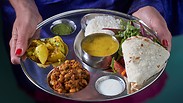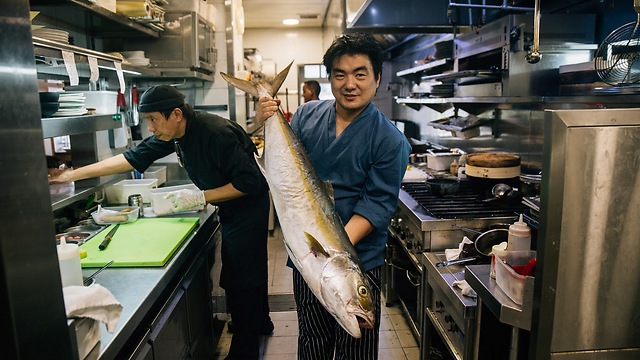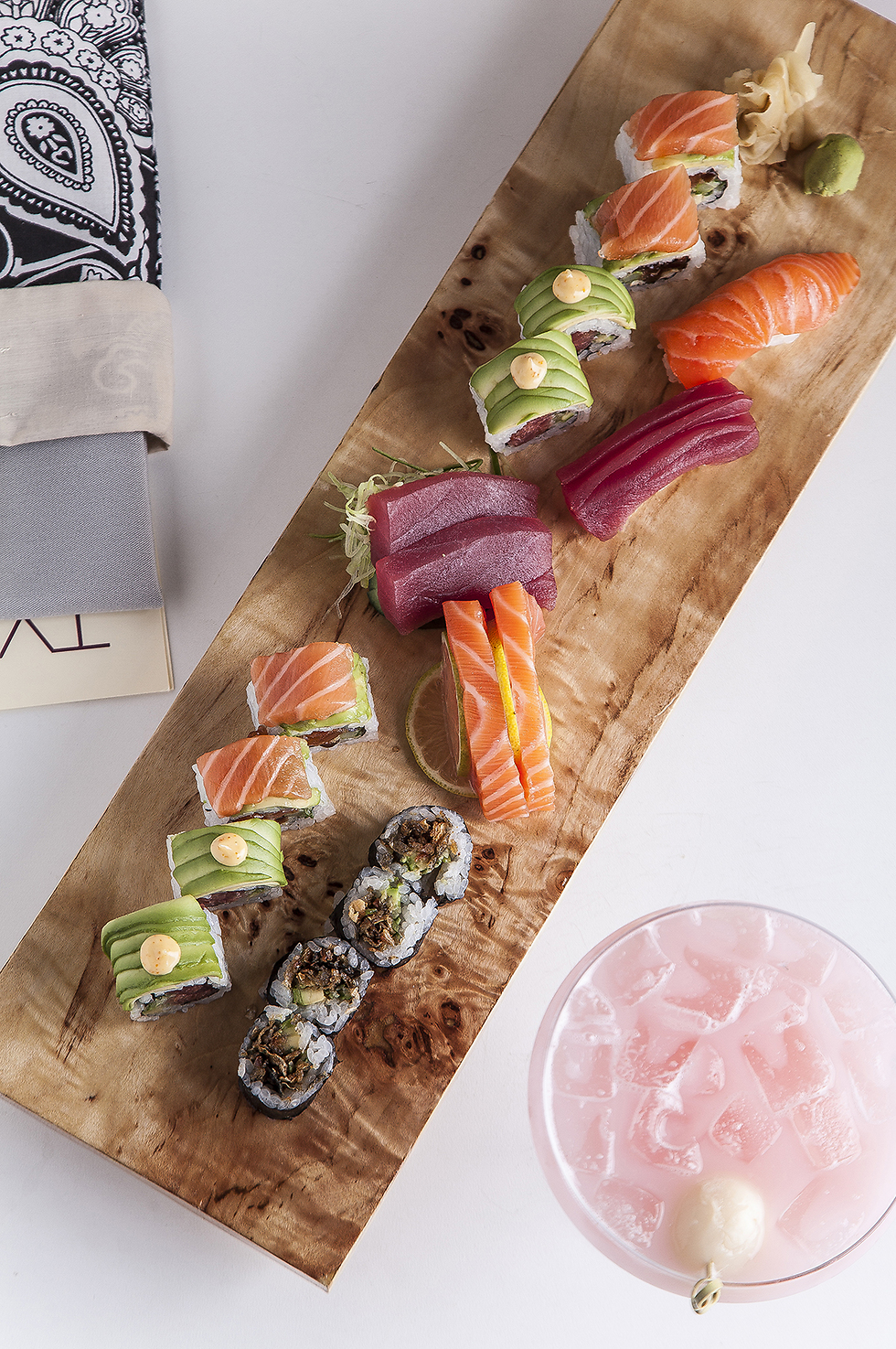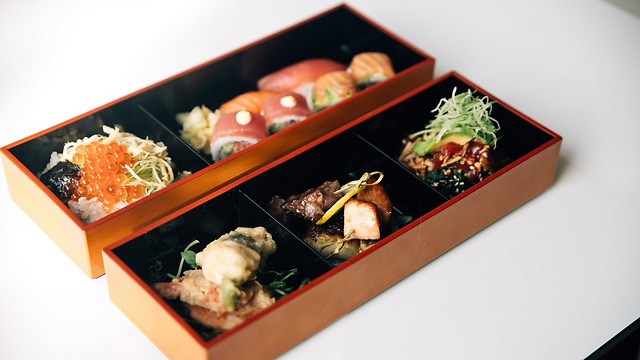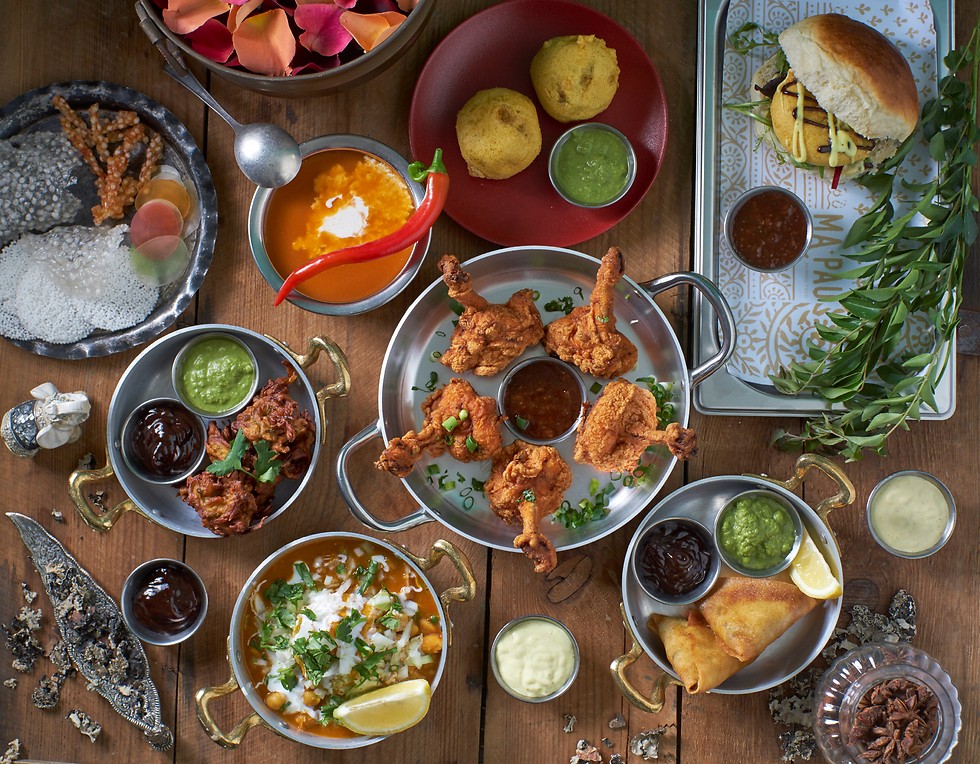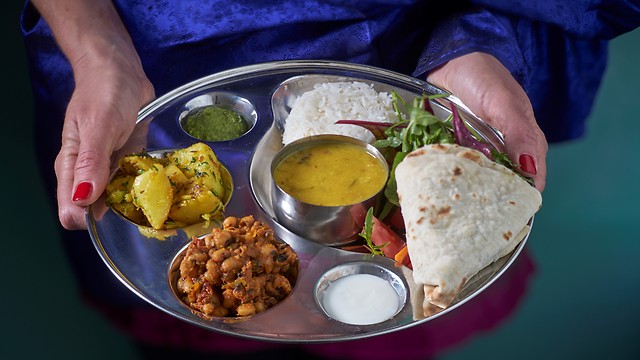
The flavors of Japan and India in Tel Aviv
Review: Although they are neighbors in downtown Tel Aviv, the Japanese TYO and Indian Ma Pau are opposites not only with regard to the geographical locations of the cuisines they represent--the former is fine dining, while the latter is casual; but both are on top of their game.
The exterior of the two-story building at the corner of Montefiore and Hanna and Mordekhai Veisser Streets shows faints signs of its former grandeur, but the interior—furnished with pale woods and leather chairs—is certainly elegant, down to the smallest detail, such as cloth napkins in special sleeves.
In Japanese cuisine, of course, esthetics famously extend to food presentation, and they start at TYO with the restaurant’s specialty cocktails. The “bloodshed martini,” for example, was served not in a martini glass but a regular glass overflowing with crushed ice topped with delicate violet flowers and garnished with a long sprig of rosemary. This blend of vodka, triple sec, pomegranate juice and honey was not as sweet as it sounds and had a nice complexity.
The extensive menu is in three languages, with French joining the usual two. There is also a separate business lunch menu representing good value weekdays until 4pm.
Next was grouper tataki: slices of the raw fish slathered with yuzu juice and hot sesame oil, garnished with red chili pepper. The marinade enhanced the fresh fish nicely without overwhelming it.
This was accompanied by a seaweed salad comprising two kinds of seaweed, shiitake mushrooms, avocado, cucumber and carrot, which came with a creamy dressing of miso, yuzu and Japanese mayonnaise. The salad was delicious and refreshing, while the dressing could be addictive.
TYO’s Gunkan combination might well be considered one of the restaurant’s signature dishes. Gunkan means worship, our waiter informed us, and the dish consists of three small shrine-shaped mounds of rice with different wrappings, two of which are topped with goose liver—an ingredient that adds a creamy richness to an inspired combination.
All the condiments accompanying the Gunkan entree—as well as the excellent sushi sampler that followed—are made in-house, including the wasabi and the pickled ginger. The superiority over their commercial equivalents—especially in the nuance of the ginger—is remarkable.
We washed the sushi down with the ultra-smooth house sake, served from a carafe on a bed of ice in its own tray. TYO takes deserved pride in the selection of premium sakes featured on the restaurant’s dedicated sake menu.
The desserts continue TYO’s tradition of beautiful presentation and innovative combinations. The star among them bears the funky name Mr. Bean, after the asoka bean, a staple of Japanese sweets. The spongy asoka bean cake sits on hot earl gray sauce and is surrounded by candied hazelnuts and topped by green tea ice cream, while a warm and treacly mint caramel sauce is drizzled tableside over it all. Truly, a feast of sweet flavors.
Throughout the meal, the service was impeccable: water glasses refilled, our table cleared and silverware and chopsticks replaced between courses, even cleansing towelettes profferred with their wrappers torn open. Along with the exquisite food, this is a definite hallmark of an undisputedly top-tier restaurant.
TYO.
Not kosher.
Montefiore 7, Tel Aviv.
Tel. (03) 930-0333.
Mumbai street food finds a home
With more and more young Israelis returning home from spending time in India, there has been a boomlet of Indian restaurants opening in Tel Aviv. But Ma Pau has an advantage over most: the owners’ late mother hailed from the subcontinent.
Ma Pau has only been open three months, but its tasty food at reasonable prices has already managed to attract a following, among both locals and tourists. For some reason, however, the restaurant still has no menus in English, although their availability is reportedly imminent. This is all the more strange because the menu’s category headings are all in English anyway.
As befits a restaurant specializing largely in the street food of Mumbai, Ma Pau is a no-frills place, with wooden benches and stools at most tables. A giant screen shows videos featuring popular contemporary Indian music.
There are no cocktails to speak of, and a very limited wine and beer selection; most disappointing is the lack of any Indian beers, but it is not the fault of the restaurant—we were told that Israel does not permit their importation.
Which narrowed down our choice of Indian beverage to the yogurt drink lassi. Unfortunately, it is available here only in sweetened versions, mango or banana. We ordered the former, which came in a tiny glass, smaller than the water glasses that accompanied the carafe of water with lime and mint that appeared on our table. Still, this was the best fruit lassi I have ever tasted: thick, with a touch of cardamom.
We started with chat, typical Bombay snacks on the menu here as appetizers. First up were the onion bhajji, onion fritters battered in chickpea flour. Unfortunately, ours were a bit overdone; but once we got rid of the burnt edges, the heart was quite good. It was also great fun dipping the fritter in the various chutneys: sweet and tart tamarind sauce, mild curry, and tehina seasoned with amba. A spicy green chutney, similar to skhoug, is available on request.
Next were the triangular chicken samosa, this time perfectly fried to a golden brown. Beneath the crispy crust was a succulent filling, enhanced in particular by a dip in the tamarind.
Last in this category were the batata wada, balls of potato mash lightly battered and flash-fried. It is hard to believe how something so simple could taste so good.
The service was fast and efficient, from a friendly wait staff, who explained that the most popular course at Ma Pau is the thali, a meal consisting of several cooked dishes eaten with rice.
We chose the chicken thali, featuring keema, ground chicken with peas, accompanied by smaller helpings of chicken tikka, yellow lentils, mixed stewed vegetables and the yogurt condiment raita. It was served in the traditional manner, on a metal tray, and in metal bowls surrounding a mound of jasmine rice, known for its thin, delicate grains. The standouts here were the chicken tikka masala, also available as a main course on its own, and the lentils—India’s ubiquitous dal.
Our only disappointment was the beef biryani, a lackluster version of the classic Indian rice dish. It was devoid of any vegetables, unless you count potato, and its only redeeming feature is that it is filling.
Among the very few desserts, the dry banana banoffee pie topped with coconut looked better than it tasted. It was washed down nicely with acceptable masala chai.
A few misses notwithstanding, one can find some of the best examples of Indian food at Ma Pau.
Not kosher.
Nahalat Binyamin 59, Tel Aviv.
Tel. (03) 773-9797.













